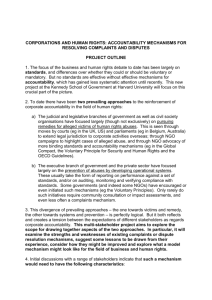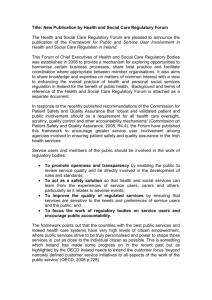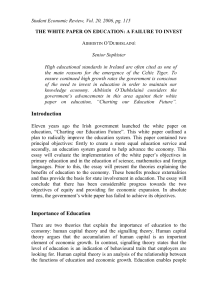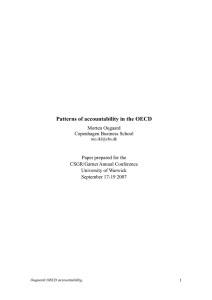2_oecd_wapes_moscow_presentation
advertisement
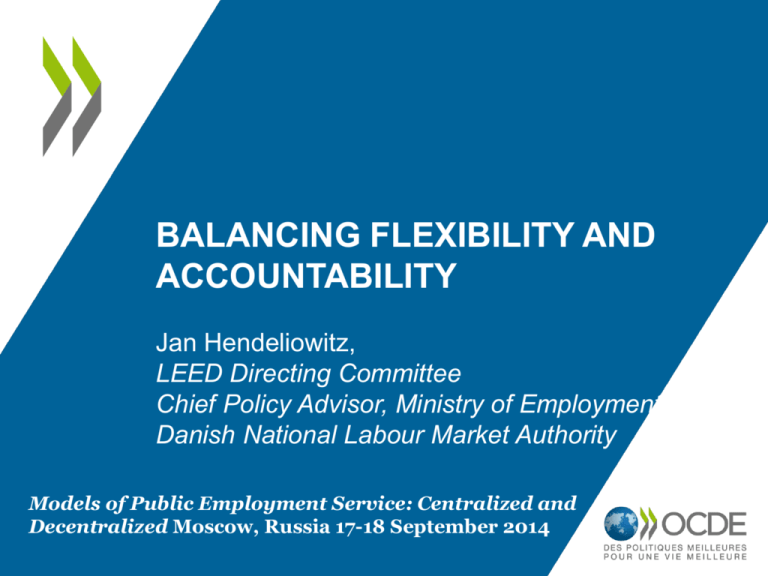
BALANCING FLEXIBILITY AND ACCOUNTABILITY Jan Hendeliowitz, LEED Directing Committee Chief Policy Advisor, Ministry of Employment Danish National Labour Market Authority Models of Public Employment Service: Centralized and Decentralized Moscow, Russia 17-18 September 2014 About us The OECD: A forum for governments to share experiences and seek solutions to common problems. The LEED (Local Economic & Employment Development) Programme: • Created in 1982 and has 37 member countries • Key themes: Employment & skills, entrepreneurship, the social economy, economic development & governance • Forum on Partnerships and Local Governance: over 2900 members in 61 countries 2 “Twenty years ago local agencies were simply responding to local issues as they came up. We needed an integrated vision if we were to transform our economic fortunes. Flexibility from the state government allowed us to develop this vision and now all the local agencies work more closely together to deliver real results for the area.” Keith Patridge, President of McAllen Economic Development Corporation. What is flexibility? ‘The possibility to adjust policy. . . to make it better adapted to local contexts, actions carried out by other organisations, strategies being pursued, and challenges and opportunities’ (Giguère and Froy, 2009). What do we mean by flexibility? • Programme design: programme mix, features including target groups, programmes outside the standard portfolio, local employment strategies • Financing: global or line item budgets, resources allocation between budget items • Target groups: locally specified groups • Goals and performance management: sub-regional goals, negotiation of targets and indicators, performance assessment not based solely on quantitative criteria • Collaboration: freedom to participate in partnerships, local decisions about collaboration • Outsourcing: responsible for outsourcing services to external providers, influence on terms of reference of contracts WHY IS LOCAL FLEXIBILITY IMPORTANT IN PES MANAGEMENT? 1. Need to respond to local variation Unemployment rate, UK Unemployment rates, skills supply and demand, demographics, etc. 2. Facilitates policy integration . . . Increasing relative importance of different factors on local policy integration Note: composite indicator based on 11 countries Source: OECD (2010), Breaking Out of Policy Silos: Doing More with Less . . . and collaboration Degree of Flexibility Degree of policy co-ordination and integration 5.0 4.5 4.0 3.5 3.0 2.5 2.0 1.5 1.0 United States Flanders, Belgium Canada Czech Republic Korea France Northern Ireland (UK) Italy Sweden Israel Ireland Australia 3. Evidence of improved outcomes • Sub-regional flexibility in management of PES is positively and statistically significantly related to employment rates in 25 OECD countries surveyed (2009) • An increase of 1 point in OECD flexibility index is related to an increase in employment rates of 1.64% HOW TO BALANCE FLEXIBILITY AND ACCOUNTABILITY? Balancing flexibility and accountability • Negotiating local targets while ensuring they add up to the achievement of national goals • Awarding flexibility incrementally: waivers, awarding to larger cities first • Boosting horizontal accountability: partnerships hold each other accountable • Using data: stimulus for cooperation and continuous evaluation of success WHAT DOES FLEXIBILITY LOOK LIKE IN DIFFERENT CONTEXTS? Flexibility in the management of employment policies & programmes, Local Job Creation project, 2013 United States Flanders, Belgium Canada Czech Republic Korea France Northern Ireland (UK) Italy Sweden Israel Ireland Australia 1.0 1.5 2.0 2.5 3.0 3.5 4.0 4.5 5.0 Example: United States Workforce Investment Act of 1998 • Local Workforce Investment Boards responsible for overseeing employment and training services under WIA in a given geographic area • Federal waivers where rigidities prevent states from responding effectively Workforce Innovation and Opportunity Act of 2014 • Streamlined WIBs with more responsibility • Some flexibility given under waivers now part of law (e.g., enhanced budget flexibility) • Strengthened accountability Thank you www.oecd.org/cfe/leed






